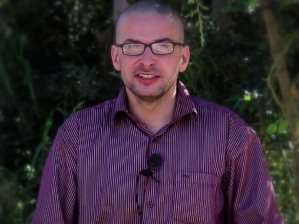
Another American citizen faces execution in the Middle East as a new video was released by Al Qaeda in Yemen threatening the life of photojournalist Luke Somers.
The 33-year old reporter was kidnapped in September of 2013 in Yemen's capital city of Sana'a, and this video marks the first time he's been seen on camera since his disappearance.
"My name is Luke Somers. I'm 33 years old. I was born in England but I carry American citizenship and have lived in America for most of my life," Somers said during the short video. "It's now been well over a year since I've been kidnapped in Sana'a. Basically I'm looking for any help that can get me out of this situation. I'm certain that my life is in danger.
"So as I sit here now, I ask if anything can be done, please let it be done. Thank you very much."
In another part of the video, senior Al Qaeda official Nasser bin Ali al-Ansi is shown voicing his displeasure with recent U.S. military operations in Yemen, and tells President Obama that he has "a time-frame of three days from the issuance of this statement to meet our demands about which they are aware."
Less than two weeks ago, U.S. Special Forces led a mission to rescue Somers from his captivity in eastern Yemen, but Somers was apparently moved just prior to the raid. The November 25 mission did lead to the rescue of six Yemenis, a Saudi, and an Ethiopian man who had also been kidnapped, but not the American.
This mission is thought to be one of the reasons for this most recent video featuring Somers, and Al Qaeda's unspecified demands to the president.
Luke Somers had been living in Yemen since 2011 where he worked as a journalist for the Yemeni Times and translator for the National Dialogue Conference. While he was born in London, England, Somers lived most of his life in the United States, where he was a citizen. He went to college at Beloit College in Wisconsin.
An investigation by The New York Times found that kidnapping is big business in the Middle East. Al Qaeda has raked in at least $125 million in ransom revenue since 2008, with $66 million being paid in 2013 alone.
The United States and Britain both have strict policies against negotiating with kidnappers or paying ransoms, and the revenue was made almost exclusively by European governments who have no such policy.
But this doesn't mean that these kidnappings are not taken seriously. The Pentagon acknowledged the failed rescue attempt in a statement made earlier today. "As we have said repeatedly, the United States government is committed to the safety and well-being of its citizens, particularly those suffering in captivity," Pentagon Press Secretary Rear Adm. John Kirby said in the statement. "We use the full breadth of our military, intelligence, law enforcement, and diplomatic capabilities to bring people home whenever we can."
And the Yemeni government has also spoken up to acknowledge the situation, saying that it is "doing its utmost, coordinating efforts with regional and international partners to secure the safe release of hostages in accordance with relevant international standards."







